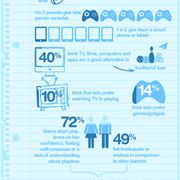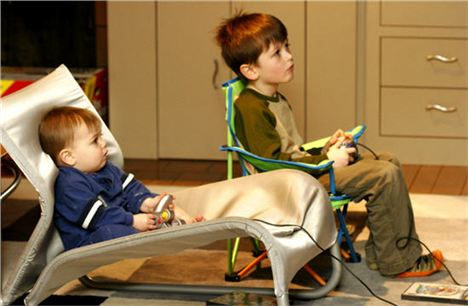TIME-POOR, technology-obsessed, and self-doubting parents are in danger of play amnesia according to a study that has concluded parents spend less than an hour a day playing with their children.
Many parents rely on high-tech toys to keep their kids amused. Over a quarter of parents admit they put on a DVD to entertain their children instead of playing with them.
Dr Miriam Stoppard, parenting expert and spokesperson for Galt Toys, conducted a study of 3,000 parents of children aged 0-10. She discovered the average busy parent spends just 56 minutes a day playing one-to-one with their children – less than an episode of Britain’s Got Talent. More than one quarter of mums and dads polled spend just 30 minutes or less on quality playtime.
Instead, many parents rely on high-tech toys to keep their kids amused. Over a quarter of parents admit they put on a DVD to entertain their children instead of playing with them. Close to one in five rely on game consoles to keep their children amused, and one in six give them a smart phone or tablet to play with.
 Play Amnesia StatisticsDespite this, only a quarter of parents actually believe TV, films, computers and apps are a good alternative to traditional play and toys. Parents also admit their children don’t enjoy these activities as much as playtime. Only 10 per cent think their children prefer watching TV to playing and only fourteen per cent think they prefer electronic games and gadgets.
Play Amnesia StatisticsDespite this, only a quarter of parents actually believe TV, films, computers and apps are a good alternative to traditional play and toys. Parents also admit their children don’t enjoy these activities as much as playtime. Only 10 per cent think their children prefer watching TV to playing and only fourteen per cent think they prefer electronic games and gadgets.
The research found technology particularly impacting on play. Sixty-five per cent of mums and dads felt that demands from work, emails, social media, and texts on a daily basis was resulting in less ‘child-time’. A common complaint was that their own parents had fewer such distractions.
Dr Miriam Stoppard said: “These findings are incredibly sad. A parent is a child’s first teacher and playing with babies and toddlers is absolutely crucial to their early development. Every time a baby plays, it thinks. And every time it thinks, it develops half a million brain connections.”
To add to all this – time pressures and modern demands are taking their toll as parents feel self-conscious and inadequate when it comes to playing. Seventy-six per cent of parents blame short playtimes on low confidence and a lack of understanding about how important play is. Some parents even find it boring.
Self-doubt has a big impact too. Nearly half of parents felt envious or inadequate in comparison to other parents. The research found that nearly one third of those polled think parents have forgotten how to play with their child.
One in ten parents wait until the other parent comes home to take on playtime duty, with dads finding play with the kids less boring than the mums did. Perhaps most tellingly, a quarter of parents would rather do the housework than play with their children.
John McDonnell, Managing Director of Galt Toys, said: “Despite being well aware of time pressures on today’s parents, it is still quite shocking to find out that so little time is spent playing one-to-one with children. It is a shame to hear children are watching TV or playing with gadgets instead of playing with their parents which is so much more beneficial.”
 Many parents rely on high-tech toys to keep their kids amused
Many parents rely on high-tech toys to keep their kids amused
For most families, the traditional evening bedtime routines still exist – such as playing at bath time and bedtime stories – but even these have been drastically cut. We now spend on average of only sixteen minutes on bedtime stories.
Dr Miriam Stoppard said: “Our study found that many parents avoid or reduce bath and bedtime activity for fear of getting children too excited before they go to sleep. But this is the time of day when you’re back from work and there are the least demands on your time so is the perfect opportunity to spend some quality time with your little ones.”
Interaction is key for kids. Instead of playing alone, the research showed children much prefer playing with others. Rather than other children or siblings, the favourite choice of playtime partners were their parents. In the survey, only nine per cent of children preferred playing alone despite nearly 30 per cent of parents leaving them to amuse themselves. The numbers are quite saddening.
Dr Miriam Stoppard concluded: “Mums and dads should trust their own instincts and avoid comparisons with other parents and children which is damaging to their confidence. Playing with your child should be fun, not a chore, and it is easy to do after a few tips.”












